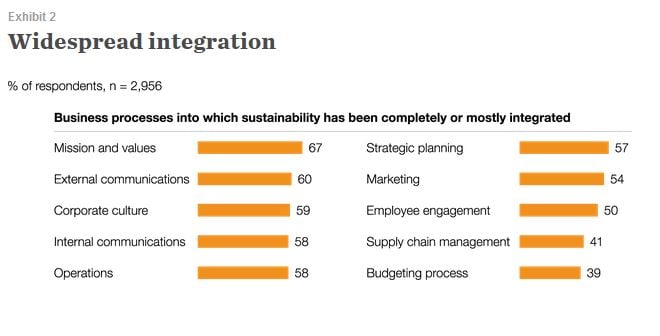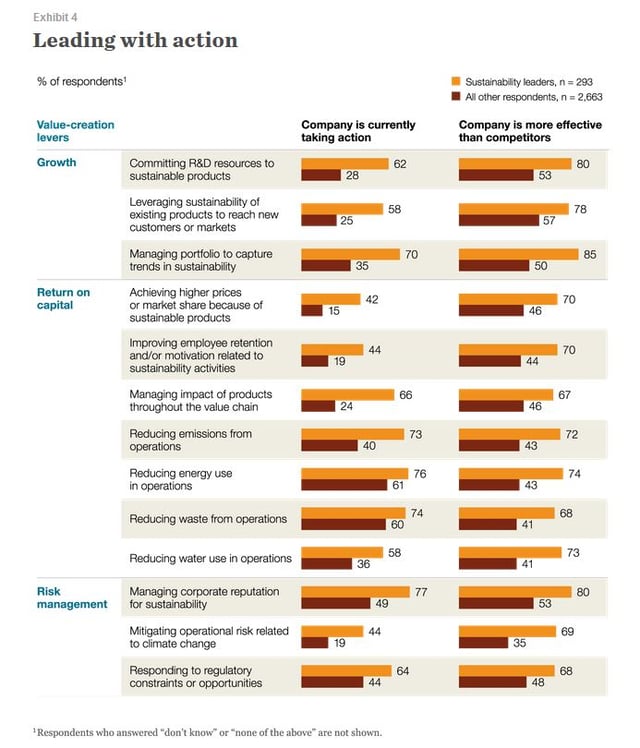If you don’t frame it in terms of business longevity, sustainability becomes an altruistic activity which is ‘good to have’. It then gets relegated to periods of time when someone is in a good mood.
Anirban Ghosh, Chief Sustainability Officer, Mahindra Group
Sustainable goals can seem a bit daunting to implement. Why fix something that's working fine? One part of sustainability is long-term thinking and accountability. Any business knows that building trust, with consumers or clients, takes time and planning. Therefore sustainability is a long-term investment in a business's longevity.
Here are three reasons why corporate sustainability is worth pursuing:
1. Return on investment and capitalThe value of sustainable investments for corporations has already been proved. In the case of Dow Chemical, a $2 billion investment in resource efficiency resulted in a $9.8 billion saving from reduced energy consumption. In 1996, through a separate initiative, Dow also created a set of goals for environmental, health, and safety issues, and it has ensured their integration into the company’s processes by tracking progress with clear metrics. As a result Dow, with a 20 percent reduction in absolute greenhouse gas emissions, has gone well beyond Kyoto Protocol targets.
Companies seen as sustainable leaders in their industries have achieved can also reach new markets and customer easily, achieve higher market shares all while reducing waste.
2. Access to capital
According to Mark Horoszski of Movingworlds.org, having sustainable and socially responsible goals can increase access to capital.
This is largely because Impact Investing is growing. Some reports estimate that the size of the impact investing market will grow to over $500 Billion by 2020.
Companies should follow the Global Impact Investing Networks “IRIS” standards for their internal reporting and take a third-party impact assessment, like GIIRS, to qualify for impact capital. This metric is intended to help organizations categorize their environmental impact objectives in a standardised format.
Interestingly, as reported in Forbes, investors do feel that there is a shortage of impact-worthy social impact investments. Meaning that if your business is healthy and can prove social and sustainable impact, there is a large pool of capital waiting to be deployed.
3. Existing technology can lead to more sustainable practices
Technology can help with reporting and the implementation of sustainable practices. Companies such as Patagonia have mapped out their supply chain and from that were able to piece together a ‘big picture’ view of their environmental and social impact.
In many cases, there is no need to commission a new system or platform from scratch to achieve sustainable goals or understand a company’s weak points.
However McKinsey has already done some research on where many companies have an opportunity to expand their sustainable integration.
 As you can see, companies are not doing as much as they can to integrate sustainability into internal communications and employee engagement as other parts of the business. A company's sustainable initiatives are becoming increasingly more important when attracting new talent and retaining employees. The McKinsey study found that sustainable leaders in their survey were better at engaging employees on this issue (and at keeping employees at all levels more informed), suggesting that it’s possible to make the most of this opportunity in sustainability.
As you can see, companies are not doing as much as they can to integrate sustainability into internal communications and employee engagement as other parts of the business. A company's sustainable initiatives are becoming increasingly more important when attracting new talent and retaining employees. The McKinsey study found that sustainable leaders in their survey were better at engaging employees on this issue (and at keeping employees at all levels more informed), suggesting that it’s possible to make the most of this opportunity in sustainability.
Find out how our clients have led sustainable practices from the top by starting with sustainable board meetings.










